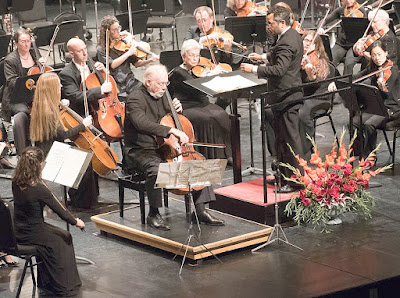The audience left the Hemmens Main Hall brimming with excitement Sunday as the Elgin Symphony Orchestra wrapped up its opening weekend of Ives, Brahms and Tchaikovsky, conducted by ESO Music Director Andrew Grams.
After an uplifting rendition of the National Anthem, the program started with Variations on America (1892) by a teenaged Charles Ives, composed originally for the organ. It's the kind of piece that benefits from an introduction, and an affable Grams relaxed the concert's usual decorum to share a few words about the composer and his work, illustrated with musical excerpts played by the orchestra.
The 1964 arrangement by William Schuman remarkably preserves the sound of two keyboards with pedals, evoking the humor of circus organs or silent movies, and the orchestration is reminiscent of P.D.Q. Bach. But in comedy we hear the truth, and Ives' genius was indeed ahead of its time.
Joining the ESO for two works by Tchaikovsky was Lynn Harrell, known in music circles as the "Dean of American Cellists," whose 50-year career includes appearances on the world's greatest concert stages, the Grammy Awards broadcast and the Vatican.
 |
| Cellist Lynn Harrell performs Tchaikovsky's Andante cantabile from String Quartet No. 1 with Elgin Symphony Orchestra. (Photo by James Harvey) |
The eight-part Variations on a Rococo Theme (1877) was a showcase for Harrell's effortless technique. Bowing from the wrist, his delicate high passages were like an angel's laughter: lighter than air. Across the low register, his timing and placement was like Russian ballet dancers barely touching the floor.
Even subtler still was the Andante cantabile from String Quartet No. 1 (1871), in which the orchestral accompaniment was impossibly soft and superbly conducted. Harrell seemed to work from a place beyond method or doctrine, quoting from memory, playing the whole instrument as easily as exhaling a breath.
The ESO has welcomed its share of rising stars, but the elocution of an artist with Harrell's experience is in a class by itself.
Walking briskly to the podium after intermission, Maestro Grams launched his colorful and emotive 45-minute interpretation of Brahms' Symphony No. 1 in C Minor. The well-known piece rejoiced in a wealth of understanding and affection within the ensemble. Excellent wind solos attested to the players' exceptional preparation for the start of a concert season.
 |
| Elgin Symphony Orchestra Music Director Andrew Grams. (Photo by James Harvey) |
Like a brilliant film director working with great actors, Grams connected with every section in a creative two-way dialogue of motion and sound, producing a vivid musical gestalt. Only in the hands of diligent and devoted artists like these would Brahms' familiar four-movement plot (and its Beethovenian subtext) seem new again.
"Each concert is better than his last," said one awestruck musician in the audience. Grams continues to surprise listeners with the breadth of his repertoire and depth of his ability, and we are eager to learn whether the well has any bottom.
